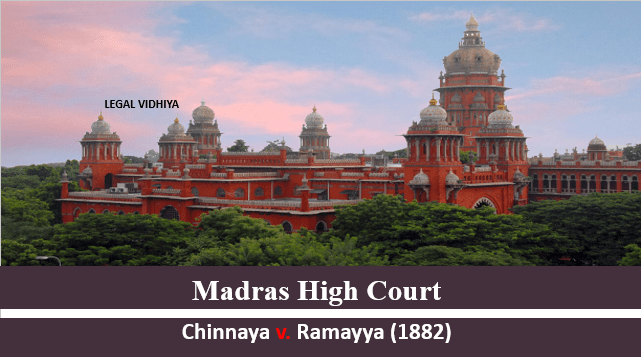
| Citation | Chinnaya Vs. Ramayya (1882) ILR (1876-82) 4 Mad 137 |
| Date of Judgment | 21st October 1987 |
| Court | Madras High Court |
| Case Type | Civil |
| Appellant | Venkata Chinnaya |
| Respondent | Venkata Ramayya |
| Bench | Innes J, Kindersley J |
| Referred | Indian Contract Act,1872 |
FACTS OF THE CASE
An elderly lady who owned a property decided to transfer the entirety of her property to her daughter, Venkata Ramayya, the respondent in the case. This transfer was executed through a ‘Gift Deed,’ with the condition that the daughter, Ramayya, would be required to make an annual payment of Rs. 653 to the lady’s sister, the appellant Venkata Chinnaya. In response, the daughter, Ramayya, accepted this condition and willingly agreed to honour her commitment by making the specified annual payment to her aunt, Chinnaya. The parties thus entered into a legally binding contract. However, after the death of the elderly lady, Ramayya refused to pay the agreed annuity to her aunt, leading Chinnaya, the appellant, to seek legal recourse.
ISSUES
1) If the respondent is contractually obligated to pay the said amount if the consideration was provided by a third party?
2) If the doctrine of ‘privity of consideration’ is applicable in an Indian context?
ARGUMENTS
During the court proceedings, the respondent, Ramayya, argued that she should not be held liable to pay any annuity to her aunt, Chinnaya, primarily because she had not received anything of value from her aunt as consideration. She cited Section 10 of the Indian Contract Act, 1872, which stipulates the necessity of valid consideration in a contract.
In response, the appellant, Chinnaya, contended that the entire property gifted to Ramayya by their sister, the elderly lady, should be considered as the consideration. However, Ramayya countered this by asserting that the gifted property could not be regarded as valid consideration because it did not originally belong to Chinnaya, making her a stranger to that property. Consequently, Ramayya argued that the contract between them, the appellant, and the respondent, lacked validity due to the absence of valid consideration from the appellant
JUDGEMENT
According to Justice Kindersley, the property gifted and the respondent’s commitment to pay an annual annuity of Rs 653 could be seen as integral components of the contract. The respondent’s initial promise to pay the appellant the annuity amount, followed by her refusal to do so after the death of the elderly lady, constituted a breach of the contract. This breach conferred upon the appellant the legal entitlement to initiate a lawsuit against the respondent in order to collect the promised sum. The Court ordered the respondent to fulfil her obligation by paying the appellant the annuity amount, affirming the contract’s enforceability between the parties. The Honorable Judges concluded that while individuals who are not parties to a contract cannot file lawsuits against those who are parties to it, a third party considered a stranger to consideration, can initiate legal action if they are beneficiaries in the contract and seek recovery of the promised amount. This case also established that the concept of privity to consideration does not apply in the Indian context under the Indian Contracts Act,1872. The principle of privity of consideration flowed in Indian law is different from that of English Law. Under the Indian Contract Act, 1872 it is clearly provided that the consideration may move from a promise or any other person. Therefore, consideration may flow from a stranger to the contract as well. However, under English law, consideration must always move from the promise only and not from a stranger.
REFERENCES
Online sources:
1)SCC online
2)Indian Kannon
3) https://blog.ipleaders.in/the-doctrine-of-privity-and-exceptions-to-its-application/
4) https://lawfoyer.in/chinnaya-vs-ramayya/
This Article is written by Thanmaya Reddy, School of Law, CHRIST (Deemed to be University) Intern at Legal Vidhiya.




0 Comments